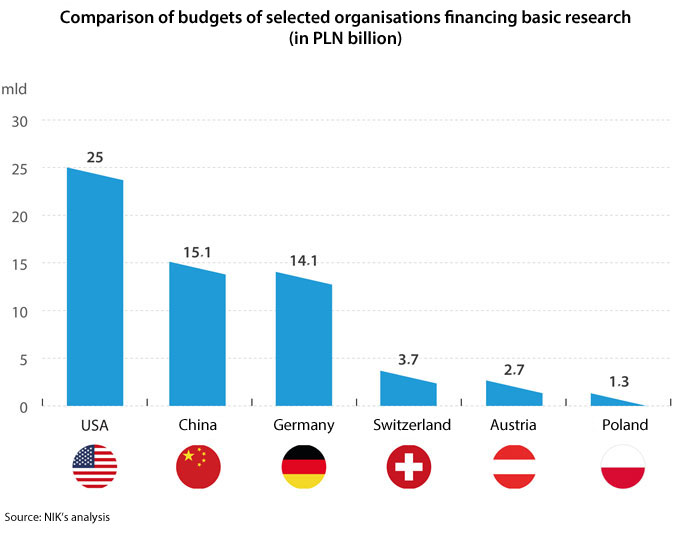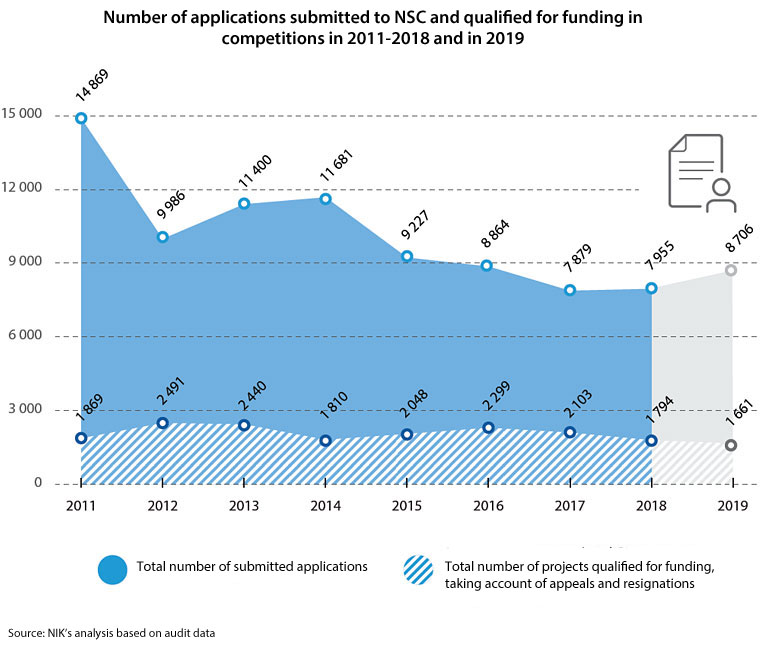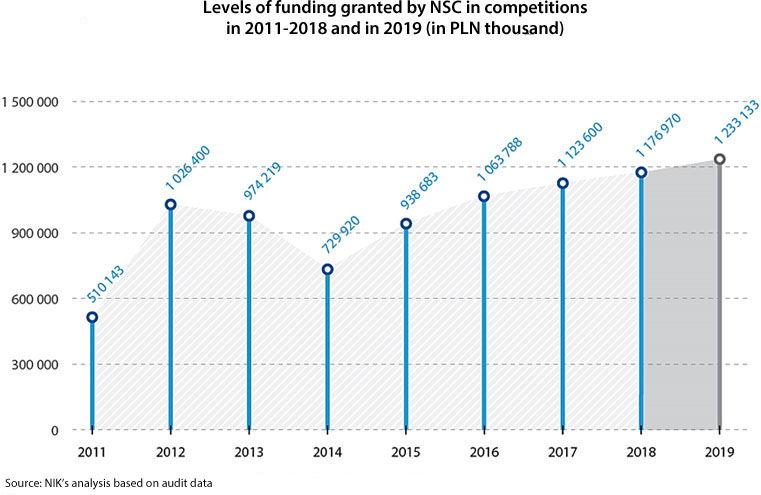NIK about financing basic research
Within 8 years the National Science Centre (NSC) has granted nearly PLN 7.5 billion for basic research. The research has great impact on our country’s innovativeness. Though, it often takes time to translate research results into practical use. The audit findings show that the grants for research projects were provided properly. Some irregularities occurred on part of beneficiaries while implementing projects. NIK also pointed to some weakness of the NSC supervision as the irregularities were not identified in the course of the projects’ review.
The basic research, in line with its statutory definition, comprises empirical or theoretical works aimed at gaining new knowledge about the basics of phenomena and observable facts. A characteristic feature of such research is that it is not focused on direct commercial use. Though, the research is critical for the development of science and the state as it helps build the intellectual capacity of our country and thus stimulate its economic development. The funds earmarked by individual countries for the research show how important the basic research is for the world economies.

In 2010, the system of financing basic research conducted by research facilities was changed. This is when the Minister of Science and Higher Education stopped to be responsible for granting funds for research projects. That responsibility was shifted to the newly established National Science Centre, the executive agency of the Minister of Science and Higher Education. The competences in terms of defining: basic research development guidelines, priority scientific disciplines, type of competitions and the division of funds for their financing were allocated to scientific communities, represented by 24 members of the National Science Centre Council.
The NSC Council discharged its statutory task and defined priority areas of basic research. Three main science areas were specified: Physical Sciences and Engineering, Life Sciences and Humanities, Social Sciences and Arts. They were consistent with the assumptions and objectives of the National Development Strategy 2007-2015. Those areas were properly designed as they comprised all domains of science. Specific indicators were also adopted to be used in the allocation of funds to individual research areas.
The research projects were qualified and reviewed based on the division into 25 so-called branch panels (disciplines or groups of disciplines), thematically covering the whole area of scientific research in three main domains. Also the way of reviewing applications for the funding of research projects was changed. An important element of the system became the function of discipline coordinators, that is persons responsible for calling for and conducting competitions, reviewing applications in formal terms and organising work of expert teams. Also, individuals were enabled to apply for scientific research funding. The new regulations were to help increase the number of people involved in research projects as well as to ensure more rational management of funds and effective selection of the highest-quality projects.
Key audit findings
In 2011-2018, in the competitions organised by the National Science Centre - Opus, Preludium, Sonata, Sonata BIS, Sonatina, Etiuda, Fuga, Harmonia, Maestro - nearly 82 thousand applications were submitted, of which almost 17 thousand were granted funding. Of the total number of qualified applications, over 75% were submitted by colleges or universities, nearly 20% by research institutes of the Polish Academy of Sciences, over 3% by research centres and 1.6% by other entities.

In 2011-2018, the Ministry of Science and Higher Education granted to the National Science Centre over PLN 7.54 billion for the implementation and support of research projects (of which the NSC used PLN 7.44 billion, i.e. 98.6% of funds). In 2019, the budget for basic research exceeded PLN 1.2 billion.

The NSC provided conditions for beneficiaries to achieve assumed project results. The tangible final effects included publishing research results in international papers or obtaining an academic title. All in all, it allowed preparation of over 37 thousand publications and scientific development of about 6.5 thousand persons.
Scientific communities had open access to funds for scientific research. It was possible thanks to diverse competition offers developed by the National Science Centre. The selection of co-funded projects was made in line with effective procedures and regulations. The applications submitted in the competition process were subject to an in-depth scrutiny of the NSC and the content-related two-phase verification made by independent experts. The decisions to grant funds for research qualified in the competition were taken not later than within 6 months from the application submittal deadline.
NIK did not find any non-compliance with effective procedures. Though, the results of the survey made by NIK show a weakness of the process of qualifying applications, which is arbitrariness of expert opinions which are not subject to any appeal procedure.It is worth noting that the costs related to experts’ work totalled over PLN 90 million in 2011-2018. According to respondents this has an adverse impact on the funding application process because a negative opinion determines that a project is not qualified for funding. On the other hand, NIK has taken notice of the implementation of the NSC Code which deals with the reliability of scientific research and attempts to obtain funds for research.
In the audited period the National Science Centre supervised and monitored the implementation of over 19 thousand co-funded projects, in line with effective internal regulations. The supervision of projects comprised the review of periodic reports (partial, annual and final) on the implementation of the research project as well as an inspection in the registered office of a research facility. NIK established that by the end of June 2015, the NSC did not make any formal review of the final report relating to research projects, internships or scholarships. The reason was the concentration of works related to the review of reports submitted to the NSC by the Ministry of Science and Higher Education and also the lack of an adequate module in the system to facilitate the review of final reports. The situation got better when the Department for the Settlement of Research Projects, Internships and Scholarships took over the works in that area. From 2011 to 2018, the NSC made a review of nearly 5 thousand final reports on the implementation of research projects and also settled over 11 thousand contracts for projects submitted by the Ministry of Science and Higher Education.
NIK has also noted that the key mechanism for the verification of projects’ settlement was the analysis of information submitted by beneficiaries. That information was not sufficient for an in-depth and effective review of the settlement adequacy. Besides, the NSC did not have enough personnel to conduct the project implementation control with the beneficiaries. From 2012 to 2018, the National Science Centre carried out only 112 controls of this type from over 19 thousand co-funded projects. As a result of those controls, the NSC claimed the reimbursement of over PLN 4.8 million. Therefore, according to NIK, the NSC needs strengthening of its control capacity.
Also the NIK controls covering most projects (143 projects implemented by 15 beneficiaries) which NSC considered as accomplished and settled, revealed some irregularities. Nine of 15 controlled beneficiaries carried out projects ignoring the established rules. For instance, some unauthorised changes (without NSC’s consent) to contractual terms were made, experiments on animals were conducted without consent of a relevant ethical committee, non-qualified expenses were unreasonably allocated as project costs, contracts with researchers were signed ignoring the regulations effective in those entities, obligatory reports on the project implementation were not submitted or were submitted with delays.
The Supreme Audit Office noted that the NSC has not developed any methodology for evaluating the impact of basic research on the development of Polish science. As a consequence, it is much more difficult to achieve outstanding research results and take targeted decisions in this area. At the same, it cannot be defined to what extent the results of research funded by the National Science Centre impact the science development.
According to NIK, the Minister of Science and Higher Education properly supervised the NSC activity. An exception was the limited verification of requirements to be met by the members of the so-called Identification Team and the NSC Council, where the requirements were supposed to prevent the conflicts of interests. Mainly, the members should not be married to each other, also there should not be any consanguinity or affinity up to the second degree. Besides, the members should not be in a legal relationship with the Council members, Expert Teams, NSC Director or Discipline Coordinators as it may have impact on their rights and obligations. NIK has noted that candidates for the Identification Team members were reviewed until November 2018 based on undocumented telephone calls and then only based on an e-mail confirmation about the absence of the said restrictions. At the same time, the NSC Council members were reviewed based on the declaration of knowledge of regulations which was not identical to those persons’ declaration of will about the compliance with those regulations.
Recommendations
to the Minister of Science and Higher Education to:
- properly verify if members of the Identification Team and the NSC Council meet the requirements defined in the NSC Act, mitigating the risk of a conflict of interests.
to the Director of the National Science Centre to:
- develop an effective methodology for evaluating the impact of basic research financed by the NSC on the development of Polish science;
- take efforts to strengthen the NSC control capacity and increase the scale of controlling projects conducted with beneficiaries;
- the NSC should - when possible - use its rights and make sure scientific experts carry out follow-up controls of projects for which the 5 years’ deadline has not passed (with particular consideration of NIK audit results).


